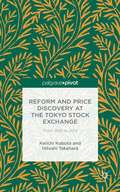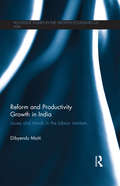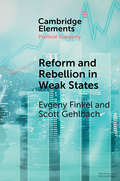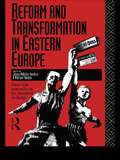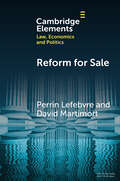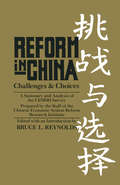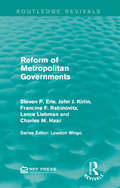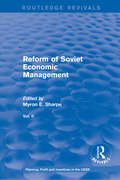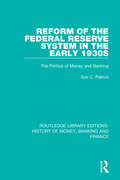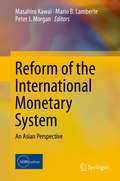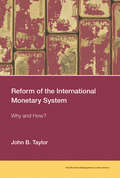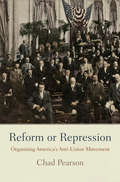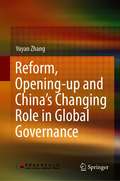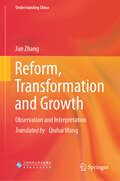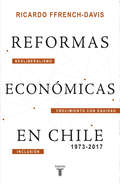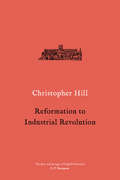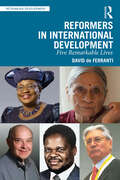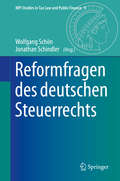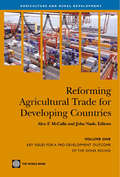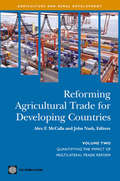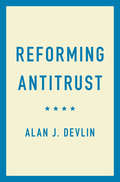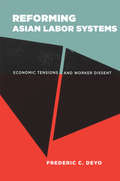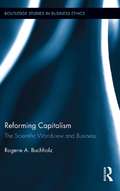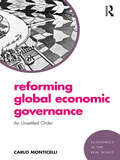- Table View
- List View
Reform and Price Discovery at the Tokyo Stock Exchange: From 1990 to 2012
by Keiichi Kubota Hitoshi TakeharaIn this book we analyze the impact of the evolution of the Tokyo Stock Exchange (TSE), at the same time discussing reforms in stock trading by related accounting standards and legal regulations.
Reform and Productivity Growth in India: Issues and Trends in the Labour Markets (Routledge Studies in the Growth Economies of Asia)
by Dibyendu MaitiDuring the last two decades, India has experienced a high growth rate, but the contribution from productivity growth and technological progress has been very low. This has resulted in a poor performance in the employment generation in the formal sector, and this book examines this phenomenon and the Indian growth pattern. Using primary and secondary data, the book looks at the impact of economic reform on technological change and total productivity growth, and in turn its impact on the labour market. It examines the effect of trade reform on the form and functioning of labour markets, and goes on to look at the impact of the global financial crisis on the Indian labour market. Offering interesting modelling exercises and empirical verifications that bring fresh ideas and new content, this book is of interest to academics in the fields of development economics, international economics and South Asian studies.
Reform and Rebellion in Weak States (Elements in Political Economy)
by Scott Gehlbach Evgeny FinkelThroughout history, reform has provoked rebellion - not just by the losers from reform, but also among its intended beneficiaries. Finkel and Gehlbach emphasize that, especially in weak states, reform often must be implemented by local actors with a stake in the status quo. In this setting, the promise of reform represents an implicit contract against which subsequent implementation is measured: when implementation falls short of this promise, citizens are aggrieved and more likely to rebel. We explore this argument in the context of Russia's emancipation of the serfs in 1861 - a fundamental reform of Russian state and society that paradoxically encouraged unrest among the peasants who were its prime beneficiaries. We further examine the empirical reach of our theory through narrative analyses of the Tanzimat reforms of the nineteenth-century Ottoman Empire, land reform in ancient Rome, the abolition of feudalism during the French Revolution, and land reform in contemporary Latin America.
Reform and Transformation in Eastern Europe: Soviet-type Economics on the Threshold of Change
by János Mátyás Kovács Márton TardosFirst published in 1992. Routledge is an imprint of Taylor & Francis, an informa company.
Reform for Sale: A Common Agency Model with Moral Hazard Frictions (Elements in Law, Economics and Politics)
by David Martimort Perrin LefebvreLobbying competition is viewed as a delegated common agency game under moral hazard. Several interest groups try to influence a policy-maker who exerts effort to increase the probability that a reform be implemented. With no restriction on the space of contribution schedules, all equilibria perfectly reflect the principals' preferences over alternatives. As a result, lobbying competition reaches efficiency. Unfortunately, such equilibria require that the policy-maker pays an interest group when the latter is hurt by the reform. When payments remain non-negative, inducing effort requires leaving a moral hazard rent to the decision maker. Contributions schedules no longer reflect the principals' preferences, and the unique equilibrium is inefficient. Free-riding across congruent groups arises and the set of groups active at equilibrium is endogenously derived. Allocative efficiency and redistribution of the aggregate surplus is linked altogether and both depend on the set of active principals, as well as on the group size.
Reform in China
by B.L. ReynoldsThis work includes every Supreme Court case relevant to gender and sexual equality from 1787 to the end of the 1999/2000 term. It is a primary document reference book, organized in eight chapters, including civil and social rights and duties; morality and sexual ethics; and education policies.
Reform in the Chicago Public Schools
by Matthew C. Weinzierl Katrina FlanaganIn 2012, the Chicago Teachers' Union went on strike over proposed reforms by the city's mayor, Rahm Emanuel. At the heart of the reforms, and the strike, was frustration over many decades of underperformance in the Chicago Public Schools (CPS) and a surge of controversial, largely market-based, experimentation in public education in many U.S. cities.
Reform of Metropolitan Governments (Routledge Revivals)
by Steven P. Erie Charles M. Haar John J. Kirlin Francine F. Rabinovitz Lance LiebmanOriginally published in 1972, this study aims to explore governmental interaction with people and publics interests and institutions in Metropolitan America. These papers discuss issues of how governance can be improved and the federal role in Metropolitanism as well as suggesting ways in which political reform can help. This title will be of interest to students of Environmental Economics and professionals.
Reform of the Federal Reserve System in the Early 1930s: The Politics of Money and Banking (Routledge Library Editions: History of Money, Banking and Finance #12)
by Sue C. PatrickThis book, first published in 1993, examines in detail the bureaucratic and political manoeuvring surrounding the enactment of banking and monetary reforms in the 1930s. Although banking reform influenced the politics of both the Hoover and Roosevelt presidencies, most surveys devote only a few pages to monetary disturbances and the reforms passed as a result.
Reform of the International Monetary System
by Masahiro Kawai Mario B. Lamberte Peter J. MorganBy providing a comprehensive overview of policy proposals for the international monetary system from an Asian perspective, this book aims to identify what innovations are needed to reform the international monetary and financial system to promote financial stability and sustainable economic growth for emerging economies. The book is organized into four parts. Part 1 discusses major theoretical and empirical issues related to reform of the international monetary system. Part 2 includes two chapters that present the recent developments and challenges for managing capital flows. Part 3 presents different perspectives on regional currency cooperation in Asia and Europe by assessing the evidence supporting increased currency coordination in Asia and by review issues of policy cooperation in the Euro area after the global financial crisis and their implications for Asia. Part 4 discusses emerging issues for regional/global cooperation and financial safety nets. The main inference of the book is that, in light of the drawbacks of the existing international monetary system exposed in the global financial crisis, along with other countries, Asian emerging economies should work cooperatively to reform and strengthen international monetary and financial policy. To do so, regional and global monetary cooperation is needed and financial safety nets should be strengthened to alleviate the impact of possible global financial crises. This will be one of the first books written about the global financial crisis and the on going the European sovereign debt crisis to comprehensively address the issues related to currency cooperation, based on the Euro area experience, with the specific implications for Asia.
Reform of the International Monetary System: Why and How? (Karl Brunner Distinguished Lecture Series)
by John B. TaylorAn argument that a rules-based reform of the international monetary system, achieved by applying basic economic theory, would improve economic performance.In this book, the economist John Taylor argues that the apparent correlation of monetary policy decisions among different countries—largely the result of countries' concerns about the exchange rate—causes monetary policy to deviate from effective policies that stabilize inflation and the economy. He argues that a rules-based reform of the international monetary system, achieved by applying basic economic theory, would improve economic performance.Taylor shows that monetary polices in recent years have been deployed either defensively, as central banks counteract forces from abroad that affect the exchange rate, or offensively, as central banks attempt to move the exchange rate to gain a competitive advantage. Focusing on the years from 2005 to 2017, he develops an empirical framework to examine two monetary policy instruments: the policy interest rate (the more conventional of the two) and the size of the balance sheet. He finds that an international contagion in central bank decisions about the policy interest rate has accentuated the deviation from standard interest rate rules that have worked in the past. He finds a similar contagion in decisions about the size of the balance sheet. By considering a counterfactual policy in the estimated model, Taylor is able to estimate by how much the policy of recent years has increased exchange rate volatility. After several rounds of monetary actions and reactions aimed at exchange rates, Taylor finds, the international monetary system is left with roughly the same interest rate configuration, but much larger balance sheets to unwind.
Reform or Repression: Organizing America's Anti-Union Movement (American Business, Politics, and Society)
by Chad PearsonHistorians have characterized the open-shop movement of the early twentieth century as a cynical attempt by business to undercut the labor movement by twisting the American ideals of independence and self-sufficiency to their own ends. The precursors to today's right-to-work movement, advocates of the open shop in the Progressive Era argued that honest workers should have the right to choose whether or not to join a union free from all pressure. At the same time, business owners systematically prevented unionization in their workplaces.While most scholars portray union opponents as knee-jerk conservatives, Chad Pearson demonstrates that many open-shop proponents identified themselves as progressive reformers and benevolent guardians of America's economic and political institutions. By exploring the ways in which employers and their allies in journalism, law, politics, and religion drew attention to the reformist, rather than repressive, character of the open-shop movement, Pearson's book forces us to consider the origins, character, and limitations of this movement in new ways. Throughout his study, Pearson describes class tensions, noting that open-shop campaigns primarily benefited management and the nation's most economically privileged members at the expense of ordinary people.Pearson's analysis of archives, trade journals, newspapers, speeches, and other primary sources elucidates the mentalities of his subjects and their times, rediscovering forgotten leaders and offering fresh perspectives on well-known figures such as Theodore Roosevelt, Louis Brandeis, Booker T. Washington and George Creel. Reform or Repression sheds light on businessmen who viewed strong urban-based employers' and citizens' associations, weak unions, and managerial benevolence as the key to their own, as well as the nation's, progress and prosperity.
Reform, Opening-up and China's Changing Role in Global Governance
by Yuyan ZhangThis book looks back to 40 years ago for the whole history of China’s reform and opening-up and focuses on the role change of China in the relationship with outside world. In the first half part, the author explores China’s economic reform and opening-up policy from theoretical analysis and systematic interpretation. In the second part, the author aims to present how China’s international roles have changed in recent years and the Chinese appeal and purpose of participating in and improving global governance procedure. The author answers the question of why China has obtained miraculous achievements after its reform and opening-up from academic perspective and provides representative cases with profound but not obscure theoretical interpretation. It is a must-read for anyone who is interested in contemporary China’s economy and foreign affairs.
Reform, Transformation and Growth: Observation and Interpretation (Understanding China)
by Jun ZhangThis book aims to present the observation and Interpretation for China’s economic growth since Reform and Opening-up from a Chinese economist’s view. The book is divided into 5 sections, including the research of traditional socialist economic structure, China’s transformation from planned economy to market economy, reform of Chinese industrial economy, economic growth and political economy. Key topics are covered over the past 40 years including strategies for economic transformation, dual-track pricing, industrial transformation and enterprise reform, capital formation and economic growth, structural changes and productivity growth, macroeconomics, fiscal relations between central and local governments, and the political economy of growth.
Reformas económicas en Chile 1973-2017
by Ricardo Ffrench-DavisUna visión completa de la economía chilena del destacado Premio Nacional de Humanidades y de Ciencias Sociales Una lectura crítica de la economía chilena con sus tres momentos fundamentales: la implementación del neoliberalismo ortodoxo, la aplicación de modificaciones «pragmáticas» durante los ochenta y las «reformas a las reformas» que comenzaron en 1990 con la recuperación de la democracia y que durante casi tres décadas se han concentrado en la búsqueda del crecimiento con igualdad y de la reducción de la pobreza. En esta nueva edición, corregida y aumentada, el autor incluye nuevos capítulos con valiosa y relevante información, donde explica, principalmente, cómo la evaluación de las políticas de equilibrio macroeconómico acontecidas durante la última década resulta decisiva, según el autor, para volver a establecer un modelo de crecimiento equitativo e inclusivo.
Reformation to Industrial Revolution: A Social And Economic History Of Britain, 1530-1780 (The\pelican Economic History Of Britain Ser.)
by Christopher HillIn 1530 England was a backward economy, yet by 1780 it possessed a world empire and was just about to become the first industrialised power in the world. This book deals with the intervening 250 years, and tries to explain how England won its unique position in the world. This is a story that opens with the break with Europe and charts the tumultuous period of war, revolutions, and the cultural and scientific flowering that made up the early modern period. Yet, during this period Britain also become the home to imperial ambitions and economic innovation. Hill excavates the conditions and ideas that underpin this age of extraordinary change, and shows how, and why, Britain became the most powerful nation in the world.
Reformers in International Development: Five Remarkable Lives (Rethinking Development)
by David de FerrantiThis book brings to life the remarkable stories of five exceptional international development leaders and influencers: Ngozi Okonjo-Iweala, Domingo Cavallo, Ela Bhatt, Dzingai Mutumbuka, and Adolfo Figueroa. Together, their experiences and accomplishments challenge us to rethink conventional notions of leadership and international development and to reflect on how others from Africa, Asia, and Latin America will change the world in the years ahead. Drawing on the author’s decades-long relationships with each of the five, the book tells how they overcame incredible barriers and dreadful odds to rise from ordinary and challenged backgrounds to achieve extraordinary impact in important roles, both in their countries and globally. With original firsthand insights, the book explores the character-revealing decisions they made, confronting moral dilemmas between protecting their country, their career, their values, and even their lives when threatened by corrupt antagonists. The book combines a free-flowing storytelling style with an analytical framework to examine how these five determined individuals struggled to reduce poverty, protect basic rights, and promote justice. The book will be invaluable for the international development community, practitioners, students, and researchers. It will also captivate general readers new to the fascinating subject of how African, Asian, and Latin American countries develop and what that will mean for the world as a whole. While many books have been written on what should be done to help rising nations thrive, this one takes readers inside the human story of who brings about change and how.
Reformfragen des deutschen Steuerrechts (MPI Studies in Tax Law and Public Finance #9)
by Wolfgang Schön Jonathan SchindlerIn diesem Band stellen führende Vertreter der Finanzgerichtsbarkeit, der Unternehmens- und der Beraterpraxis ihre Vorschläge für die Reform einzelner steuerrechtlicher Sachgebiete vor. Das Themenspektrum reicht von unternehmenssteuerrechtlichen Fragen – nach der Zukunft des Maßgeblichkeitsprinzips, der Rechtsformneutralität zwischen Personen- und Kapitalgesellschaften, den Verlustvortragsmöglichkeiten bei Kapitalgesellschaften und der Hinzurechnungsbesteuerung – über die Abgeltungssteuer bis hin zur Digitalisierung der Finanzverwaltung und der Finanzgerichtsbarkeit. Indem er eine Vielzahl konkreter Gestaltungsideen für die aktuellen Reformdiskussionen vereint, ist dieser Band für Rechtswissenschaft und Steuerpolitik gleichermaßen relevant.
Reforming Agricultural Trade for Developing Countries
by Alex F. Mccalla John NashIn the ongoing Doha Development Round of World Trade Organization negotiations, developing countries have had much greater leverage, due at least in part to their large and growing share of world trade. But will the increased influence of developing countries translate into a final agreement that is truly more development-friendly? What would be key ingredients in such a final outcome of the negotiations, and what would the developing countries really get out of it. This two volume set seeks to answer these questions. This volume (Volume 1) is issues-oriented. It takes up some key questions in the negotiations, setting the stage with a historical overview of the Doha Development Agenda to help identify issues of most significance to developing countries, and then explores select issues in greater depth. Volume 2 addresses the question of how a development-friendly outcome to the talks would affect developing countries by quantifying the impact of multilateral trade reform. It presents several different approaches to modeling the effects of the outcome of negotiations, and then investigates why these (and other) modeling efforts produce such divergent results. Aimed at policymakers and stakeholders, this two-volume effort puts into the public domain important analytical work that will improve the chance for a pro-development outcomes of the Doha round negotiations.
Reforming Agricultural Trade for Developing Countries
by Alex F. Mccalla John D. NashIn the ongoing Doha Development Round of World Trade Organization negotiations, developing countries have had much greater leverage, due at least in part to their large and growing share of world trade. But will the increased influence of developing countries translate into a final agreement that is truly more development-friendly? What would be key ingredients in such a final outcome of the negotiations, and what would the developing countries really get out of it. This two volume set seeks to answer these questions. This volume (Volume 2) addresses the question of how a development-friendly outcome to the talks would affect developing countries by quantifying the impact of multilateral trade reform. It presents several different approaches to modeling the effects of the outcome of negotiations, and then investigates why these (and other) modeling efforts produce such divergent results. Volume 1 is issues-oriented. It takes up some key questions in the negotiations, setting the stage with a historical overview of the Doha Development Agenda to help identify issues of most significance to developing countries, and then explores select issues in greater depth. Aimed at policymakers and stakeholders, this two-volume effort puts into the public domain important analytical work that will improve the chance for a pro-development outcomes of the Doha round negotiations.
Reforming Antitrust
by Alan J. DevlinIndustrial consolidation, digital platforms, and changing political views have spurred debate about the interplay between public and private power in the United States and have created a bipartisan appetite for potential antitrust reform that would mark the most profound shift in US competition policy in the past half-century. While neo-Brandeisians call for a reawakening of antitrust in the form of a return to structuralism and a concomitant rejection of economic analysis founded on competitive effects, proponents of the status quo look on this state of affairs with alarm. Scrutinizing the latest evidence, Alan J. Devlin finds a middle ground. US antitrust laws warrant revision, he argues, but with far more nuance than current debates suggest. He offers a new vision of antitrust reform, achieved by refining our enforcement policies and jettisoning an unwarranted obsession with minimizing errors of economic analysis.
Reforming Asian Labor Systems: Economic Tensions and Worker Dissent
by Frederic C. DeyoIn Reforming Asian Labor Systems, Frederic C. Deyo examines the implications of post-1980s market-oriented economic reform for labor systems in China, South Korea, the Philippines, and Thailand. Adopting a critical institutionalist perspective, he explores the impact of elite economic interests and strategies, labor politics, institutional path dependencies, and changing economic circumstances on regimes of labor and social regulation in these four countries. Of particular importance are reform-driven socioeconomic and political tensions that, especially following the regional financial crisis of the late 1990s, have encouraged increased efforts to integrate social and developmental agendas with those of market reform. Through his analysis of the social economy of East and Southeast Asia, Deyo suggests that several Asian countries may now be positioned to repeat what they achieved in earlier decades: a prominent role in defining new international models of development and market reform that adapt to the pressures and constraints of the evolving world economy.
Reforming Capitalism: The Scientific Worldview and Business (Routledge Studies in Business Ethics)
by Rogene BuchholzThis book examines the role that the traditional understanding of science plays in how we understand the capitalistic system and how it informs business and business school education. Science serves many purposes in business organizations; it is much more than just a method to gain knowledge about business problems. It acculturates students to a certain way of thinking about the world and provides a rationale for the things business does and a justification for its purposes in society. It then utilizes the philosophy of Classical American Pragmatism to view science in a different manner, reconceptualizing the multiple environments in which business functions. Author Rogene Buchholz traces the implications of this view for our understanding of the corporation, how science is used in business organizations, the recent financial crisis, and finally what it means for management and management education. No other book examines capitalism and the business system from this unique and timely perspective.
Reforming Global Economic Governance: An Unsettled Order (Economics in the Real World)
by Carlo MonticelliThe architecture of global economic and financial governance has undergone a deep and pervasive reform in the last ten years, radically transforming international institutions and groups, such as the International Monetary Fund, the G7, and the G20. This book investigates the new, unsettled order which is now prevailing, driven by the change in the balance of power between advanced economies and key emerging market economies. Bringing together multiple strands of analysis, traditionally kept separate, Reforming Global Economic Governance: An Unsettled Order particularly explores the role of Europe within this changing world. The book documents and examines a broad range of events, building on methods from economics and other disciplines, as well as on the insights from the author’s personal involvement. This innovative approach allows the reader to ascertain the defining features of the reform: the increasing fragmentation of governance; the interconnectedness of its different elements; and the strong concern for inclusiveness. Furthermore, it presents analyses highlighting the controversial nature of the new order which underpins the current policy debate on international economic relations, including the resurgence of nationalism and trade conflicts. Through these explorations, this engaging book has direct relevance for the future prospects of international economic affairs. Offering a comprehensive view of these issues, this accessible text will appeal to scholars, insiders, and the general reader. Its detailed and thorough analyses will also be of great use to those studying economics, international political economy, and international relations.
